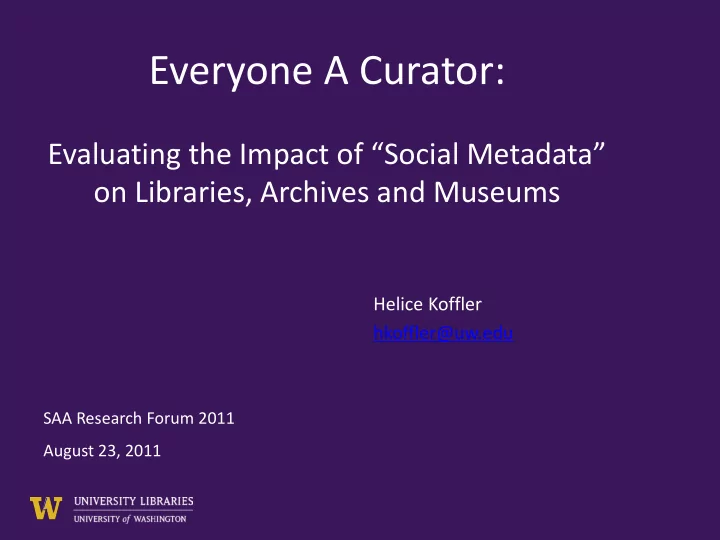

Everyone A Curator: Evaluating the Impact of “Social Metadata” on Libraries, Archives and Museums Helice Koffler hkoffler@uw.edu SAA Research Forum 2011 August 23, 2011 /
Drew Bourn, Stanford University Helice Koffler, University of Washington Douglas Campbell, National Library of New Zealand Daniel Lovins, Yale University Kevin Clair, Penn State University John Lowery, British Library Chris Cronin, University of Chicago Marja Musson, International Institute of Social History Christine DeZelar-Tiedman, University of Minnesota Henry Raine, New-York Historical Society Mary Elings, UC Berkeley Cyndi Shein, Getty Research Institute Steve Galbraith, Folger Shakespeare Library Ken Varnum, University of Michigan Cheryl Gowing, University of Miami Melanie Wacker, Columbia University Rose Holley, National Library of Kayla Willey, Brigham Young Australia University Rebekah Irwin, Yale University Beth Yakel, University of Michigan, School of Information Lesley Kadish, Minnesota Historical Society Staffed by Jean Godby, John MacColl, Karen Smith-Yoshimura
User contributions that can enrich the descriptive metadata created by libraries, archives, and museums. Issues that need to be resolved to communicate and share user contributions on the network level.
Assessment Content Policy Technical and vocabulary
Objectives of “social metadata”? How do we measure success? What is of most value? Good examples of sites? Best practice – policy, guidelines? Staffing? Moderation? Taxonomies and vocabularies? Integration/sharing of social metadata? Software, technology, functionality?
Identify research questions Select and review “social metadata” websites (76 sites chosen) Develop survey questions to distribute to site managers Analyze survey results (42 institutions responded) Read, listen, interview, and share resources Discuss all findings and write up Develop recommendations
Social Media/Networking Ways for people to communicate with each other online. User-Generated Content (UGC) Content added by users of the site. Social Media Features Interactive features added to a site that enable virtual groups to build and communicate with each other and social metadata to be added. Social Metadata Additional information about a resource contributed by users of the site. User Interaction A form of online social engagement, with users communicating with each other, such as user groups or forums. Web 2.0 Online applications that facilitate interactive, rather than passive experiences.
(= Libraries, Archives and Museums)
Report 1 – Environmental scan, use of third- party software/sites, and site reviews Report 2 – Analysis of site manager survey results Report 3 – Recommendations and bibliography
“…nobody thinks adding a wrong tag to a ceramic pot in a museum is fun.” (LibraryThing developer, Tim Spalding, in a personal communication with Working Group member, Kayla Willey, 25 March 2009)
Of the user-contributed content that would most enrich the metadata created by LAMS, more than half improve description. Almost half contribute content to the resources already offered by the site.
Figure 1: Countries represented in sites that responded to Social Metadata Survey. This includes Libraries, Archives, Museums, Community and Discipline sites.
Go Ahead! Invite user contributions without worrying about spam or abuse of site. It was very little seen. Consider how to integrate UGC back into your catalogs or descriptive metadata. Layers – user interface, layers behind, integrate?
...g o t to lo se c o ntro l, g o t to lo se c o ntro l, Go t to lo se c o ntro l a nd the n yo u ta ke c o ntro l.... Pa tti Smith – L and, Pt. 2: L and o f a tho usand danc e s, fro m Ho rse s
When they become available, there will be several links to each PDF report on the OCLC Research portion of the OCLC website: Under Publications: http://www.oclc.org/research/publications/default.htm Under Current Reports: http://www.oclc.org/research/publications/reports.htm And as an “Output” on the Sharing and Aggregating Social Metadata Project Description: http://www.oclc.org/research/activities/aggregating/default.htm
Recommend
More recommend